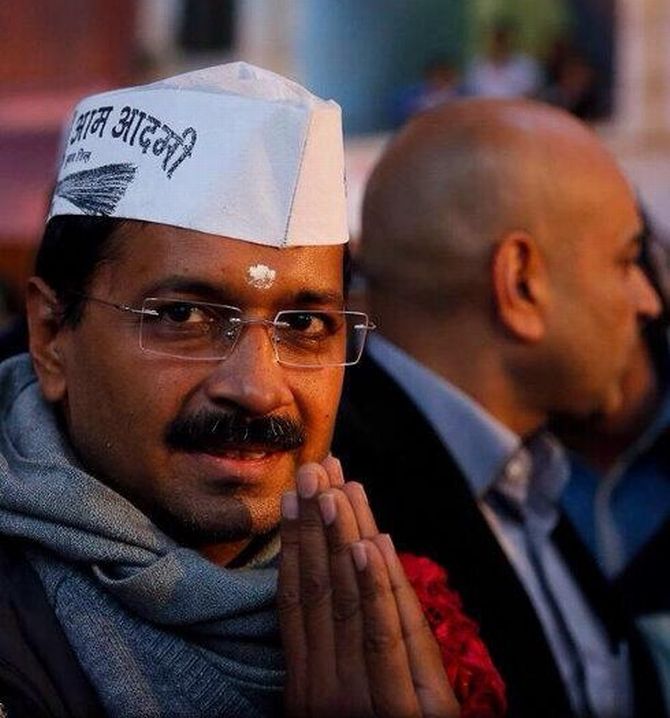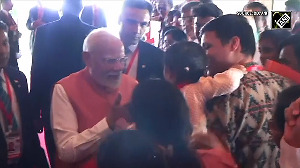 The media wittingly or otherwise has been a key player in stymying the AAP. It is not so much the rivals, but the media, mostly the television and from its cues, large sections of the print segment, who got the trophy. The political parties, especially BJP and Congress, can now laugh in their sleeves, says Mahesh Vijapurkar.
The media wittingly or otherwise has been a key player in stymying the AAP. It is not so much the rivals, but the media, mostly the television and from its cues, large sections of the print segment, who got the trophy. The political parties, especially BJP and Congress, can now laugh in their sleeves, says Mahesh Vijapurkar.
Canvassing votes in Chandigarh, Aam Aadmi Party candidate Gul Panag makes a point. For long, most Indians disillusioned with the system as run by politicians had wanted to help bring about a change but lacked a platform. They merely complained, till Arvind Kejriwal provided the platform by forming the party. Should this opportunity be missed, the country’s masses would necessarily go back to its cynicism.
In another city, former Infosys honcho, V Balakrishnan, another AAP candidate but in Bangalore said when asked on television, that if he lost the elections, all was not lost. “I shall work and make sure that the elected MP and MLAs deliver on their promises”. With that, he makes it clear that AAP, in which he is for the long term, would continue working with the people.
But that is not how the AAP and its political fortunes are seen by the chattering classes which suddenly decided that it shall put the fledgling party to a scrutiny from day one unlike what was the case with all legacy parties. They think that because the AAP government quit the Delhi government, it was untrustworthy, that ran away from its responsibilities.
Even Kejriwal has confessed to the error of having resigned, and having spread itself too thin in the Lok Sabha elections with almost 400 seats being contested. This implies that the AAP may be hard put to come anywhere close to the hit rate it managed in Delhi. The surge in volunteer activity seen there may be hard to replicate elsewhere. But the party has been game.
The tragedy is that instead of asking and understanding why he decided to resign, Kejriwal and AAP are being directly accused of inability to stay the course once it formed the government. However, I think it would be interesting to build the scenario of what would have been the course of Indian politics had two things happened: one, not resigned after 49 days in office; and two, it had acquired a simple majority in the legislature.
If the first, AAP may have been in ‘power’ but completely inadequate in doing most of the things it wanted to and set the pace for the country. The Congress’ so-called outside support was meaningless if it was bent on -- which it was -- stymying the AAP’s moves. That is why it quit hoping to expose the BJP and Congress which so far have not told the Delhi High Court, upon being asked, if they would form a government so President’s Rule could be lifted.
If the second, AAP would have been in a position to do its deeds which it sees as of significance to the ordinary person’s day to day lives. It would have been at the driving wheel. But this was not to be because of a major reason: even before it got to be seen on the EVMs inside polling booths, the carpet was pulled from under its feet.
My view that the media wittingly or otherwise has been a key player in stymying the AAP is unpopular among my peers. It is not so much the rivals, but the media, mostly the television and from its cues, large sections of the print segment, who got the trophy. The political parties, especially BJP and Congress, can now laugh in their sleeves. The first was the telecast of the so-called sting of AAP candidates’ inclination to cut corners for funds.
Of course the streamer, ‘authenticity not verified’ did run on the sting telecast but later, when AAP secured, saw the entire footage and refuted it, no TV telecast the unedited parts. This helped sow suspicion about the AAP’s morals and downgrade its electoral prospects. The narrow margin losses indicate that AAP otherwise could have had a majority on its own. Voicing this makes me an AAP troll.
No doubt the party itself made its mistakes but that was after AAP took office, one being Somnath Bharati’s infamous raids. Several others, depending on the point of view, can be listed but the point is of AAP being in government in Delhi in the context of the on-going elections to the Lok Sabha. The elections would have been different. Perhaps Kejriwal would have campaigned across India and someone else would have contested against Modi in Varanasi. Even now, the AAP is hard put to explain its resignation, with the bhagoda stamp sticking to, much as it tries to explain it now.
Between March 1 and 15, Kejriwal secured more TV time than Modi and Rahul Gandhi, according to a survey of TV coverage measured in percentages. To assume it helped AAP would be silly. Even if he topped the charts, the CMS Media Lab survey said the coverage was “more negative” than what Modi’s. AAP depends on social media with its limitations of penetration.
It does not advertise even to the extent it managed to for the Delhi assembly polls. It is absent when it comes to live telecasts which Modi and Rahul Gandhi get because the two parties provide live feeds reducing the logistic headaches of the studios. It has no wherewithal to opt, like Sonia Gandhi did earlier this week, for a three minute advertisement appeal termed ‘an address to the nation’. That was at prime time and one knows the rates.
Let me return to the main point. Had the ground not been queered except by its two rivals, which was their entitlement, the AAP would possibly have been in a different league and the complexion of the election may not have appeared more a face-off between Congress and BJP but a serious triangular fight in many constituencies than can be seen now.
Unless the undercurrent turns into votes enough to keep its enthusiasm alive for other fights ahead. Gul Panag seems to worry about that. Bala and others like Yogendra Yadav and Kejriwal may stay the course, but the voters would need some convincing. But that is for another day. Knowing how cynicism quickly spreads and takes root, Panag may be right in so far as the voters are concerned.











